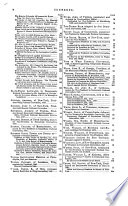 Measures, is hereby declared inoperative and void : it being the true intent and meaning of this act, not to legislate slavery into any territory or state, nor to exclude it therefrom, but to leave the people thereof perfectly free to form and regulate... Measures, is hereby declared inoperative and void : it being the true intent and meaning of this act, not to legislate slavery into any territory or state, nor to exclude it therefrom, but to leave the people thereof perfectly free to form and regulate...  Life of Abraham Lincoln - Page 162by Josiah Gilbert Holland - 1866 - 544 pagesFull view Life of Abraham Lincoln - Page 162by Josiah Gilbert Holland - 1866 - 544 pagesFull view - About this book
 | Campaign literature - 1860 - 270 pages
...1850, commonly called the Compromise Measures, is hereby declared inoperative and void ; it being the true intent and meaning of this act not to legislate...or State, nor to exclude it therefrom, but to leave the people thereof perfectly free to form and regulate their domestic institutions in their own way,... | |
 | Thomas Lanier Clingman - Slavery - 1860 - 20 pages
...1850, commonly called the compromise measures, is hereby declared inoperative and void ; it being the true intent and meaning of this act not to legislate...or State nor to exclude it therefrom, but to leave the people thereof perfectly free to form and regulate their domestic institutions in their own way,... | |
 | Henry Martyn Flint - 1860 - 476 pages
...Congress. As the Kansas Nebraska Bill stood before Mr. Chase offered his amendment, it read : It being the true intent and meaning of this act not to legislate...or State, nor to exclude it therefrom, but to leave the people therein perfectly free to form and regulate their domestic institutions in their own way,... | |
 | Michael W. Cluskey - Encyclopedias and dictionaries - 1860 - 830 pages
...commonly called the compromise measures, 10 hereby declared Inoperative and void; It being tbe tro* intent and meaning of this act not to legislate slavery...or state, nor to exclude it therefrom, but to leave the people thereof perfectly free to form ami regulate their domestic Institutions In their own way,... | |
 | Horace Greeley - History - 1860 - 250 pages
...1850, commonly called the * Compromise Measures,'is hereby declared inoperative and void—it being the true intent and meaning of this act not to legislate...Slavery into any Territory or State, nor to exclude it tJierefrom, but to leave the people thereof perfectly free to form and regulate their domestic, institutions... | |
 | James Washington Sheahan - Legislators - 1860 - 562 pages
...being inconsistent with that principle, and declaring that it was the true intent and meaning of the act not to legislate slavery into any Territory or state, nor to exclude it therefrom, but to leave the people thereof perfectly free to form and regulate their domestic institutions in their own way,... | |
 | James Washington Sheahan - Biography & Autobiography - 1860 - 566 pages
...the principle of nonintervention, established by the compromise measnres of IbW, ''it being the trne intent and meaning of this act, not to legislate slavery into any Territory or state, nor to exelnde it therefrom, bnt to leave the people thereof perffctiy free to form and regnlate their domestic... | |
 | Samuel M. Wolfe - Slavery - 1860 - 286 pages
...their own municipal institutions. The bill declared on its face that its true intent and meaning was ' not to legislate slavery into any territory or State, nor to exclude it therefrom, but to leave the people thereof perfectly free to form and regulate their domestic institutions in their own way,... | |
 | Nebraska - Law - 1860 - 248 pages
...inoperative The intent of and void ; it being the true intent and meaning of this act Sngssiavery.cem~ not to legislate slavery into any territory or state, nor to exclude it therefrom, but to leave the people thereof perfectly free to form and regulate their domestic institutions Proviso as to re-... | |
 | Benjamin Franklin Butler - Campaign literature - 1860 - 160 pages
...VOTES DOWN " POPULAR SOVEREIGNTY." The true intent and meaning of the Nebraska bill was declared to be "not to legislate slavery into any Territory or State, nor to exclude it therefrom, but to leave the people perfectly free to form and regulate their own domestic institutions in iheir own way, subject... | |
| |